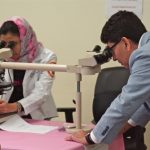Dr. Iris Martin Spotlights Resident Opportunities
Why did you become a pathologist? I’m sure all of us have heard that question many times, even the residents who have only been in the specialty a short while. And I’m sure we all have our own answers. We are drawn to medical science. We have a penchant for problem solving. We want to help patients by providing accurate and precise diagnoses that guide treatment. The latter is how I explain my choice to non-clinician friends and family who may not understand the finer points of pathology.

Iris Martin, MD, MPH
Regardless of our answer, I know that we all want to be the most well-informed and highly prepared pathologists for our colleagues and patients. That’s one of the many reasons I became involved with the CAP Foundation and currently serve on the board as the Junior Member Director. The awards and grants offered by the foundation affect pathologists at all levels of training: medical students interested in the field, pathology residents in training, and pathologists already in practice.
Particularly for residents and early-career pathologists, these awards afford opportunities many of us might not have had otherwise and provide skills and experiences that lay the framework for future leadership positions. I encourage you all to take a serious look at what the CAP Foundation can offer you: attend a meeting via the Leadership Development Award or gain access to advanced education opportunities with the Informatics Award. These are only two of the opportunities offered by the foundation; be sure to review the full list of grants and awards and share it with your colleagues.
Not only does the CAP Foundation help build pathologists’ careers, its See, Test & Treat program highlights pathologist leadership with direct patient care events that provide free cancer screening.
My interest in public health, health disparities, and inequality in the US—along with experiences in my own family and community—drew me to the CAP Foundation’s mission of providing unparalleled care in underserved communities. Find out how you can get involved with the See, Test & Treat program and speak with your hospital team about hosting a future event.
I assure you that the specialty will need well-informed leaders going forward. Involvement with the CAP Foundation and the CAP, as well as local pathology associations, will enhance your career and provide you with the knowledge and confidence to lead us into the future.
While you explore your options and think about how you can get more involved, consider giving a gift to the CAP Foundation (travel stipends can be easily donated). Help maintain these excellent programs for the pathologists and patients of tomorrow.
Sincerely,
Dr. Iris Martin


